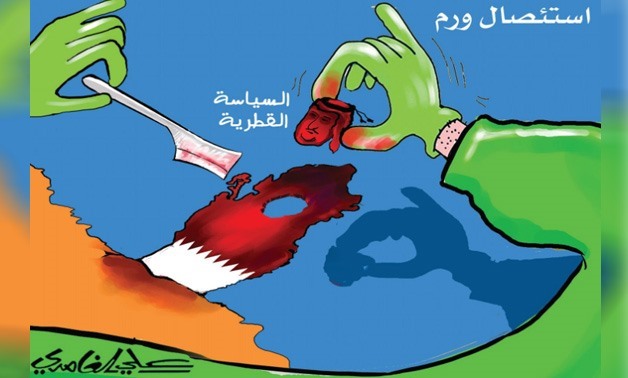
Caricaturist Ali al-Ghamdy drew Tamim Bin Hamad’s head as a tumor being extracted from the Arab region’s body – Courtesy of Al-Madina newspaper
Certainly, the decision to cut diplomatic and economic relations with Qatar, taken by a number of Arab countries like Egypt, KSA, UAE and Bahrain on June 5 had lots of reasons. The most important reason was Qatar’s support of terrorism.
This raises a question about the most important features of that support, especially given the conspicuous and open relationship it has with some terrorist groups. In light of this, we can determine the most significant features and forms of Qatari support of terrorist organizations as follows:
• Direct financial support: Evidence indicates that there is a direct Qatari funding to a number of terrorist organizations. Official documents from the U.S. Department of Treasury dated October 2014, revealed that this form of funding is given through some Qatari nationals like Salim Hassan Khalifa Rashed Al-Kuwari, described as ‘Al-Qaeda financier,’ as he is accused of transferring ‘tens of thousands’ of dollars to Al-Qaeda through a terrorist network.
Qatari support for terrorist organizations spread to North Africa. On July 29, 2017 Field Marshal Khalifa Haftar, Head of the Libyan Army directly accused Qatar of supporting and funding mercenaries from Chad and Sudan, who then fight in the ranks of terrorism in Libya.
• Indirect financial support: This is the money that Qatar pays for terrorist organizations under the guise of being ‘ransoms’ for them to release hostages. The last sum was a billion dollars Qatar paid to Shiite terrorist organizations in Iraq, in order to release some members of the ruling family in April 2016.
In addition, $700 million were paid to some Iranian nationals and local militias supported by Iran. $300 million were paid to terrorist organizations in Syria, in exchange for releasing 50 Shiite gunmen they were holding, whereas countries in the region and the world are seeking to dry up the sources of terrorism.
• Media support of terrorist organizations: there is no denying that Qatar provided great media support to terrorist organizations through Al Jazeera Channel and in publishing the statements and media materials it produces. The channel constantly broadcasted all interviews and messages sent by the leaders of Al-Qaeda, including Osama bin Laden and Ayman al-Zawahiri. Al Jazeera also interviewed the leaders of these organizations, like the interview with Abu Mohammad al-Julani leader of Al-Nusra Front, Al-Qaeda’s branch in Syria in September 2016. It also interviewed some figures in these organizations, like Abdullah al-Muhaysini, religious judge of Al-Nusra Front who was hosted in November 2016, after a video recording showed him blessing a person on his way to execute a suicide attack.
• Accommodation and logistical support: besides funding, Qatar accommodated a number of Al-Qaeda members and leaders on its land, based on what Khalid Sheikh Mohammed, Al-Qaeda member stated. In addition, Osama bin Laden’s Abbottabad documents recovered during the attack on the compound where he was hiding in Pakistan, revealed the Qatari role in accommodating a number of Al-Qaeda members. Qatar was described as a favorite destination for members and leaders of the organizations, given that it is a safe point of transit. Also, Qatar accommodated a number of outlawed Muslim Brotherhood and terrorist organization leaders in Egypt, who incite violence against the Egyptian government, like Wagdi Ghoneim, Assem Abdel-Maged and others.
Finally, there is no way for Qatar to be back again as part of the Arab and Gulf regions except if it firmly commits to stop supporting terrorist organizations, especially as the dangers of these organizations keep rising for the entire region.
Ali Bakr is an expert in Islamists movements at Al-Ahram Center for Political and Strategic Studies
This article was originally published in Arabic at Al Siyassa Al Dawliya Magazine


Comments
Leave a Comment